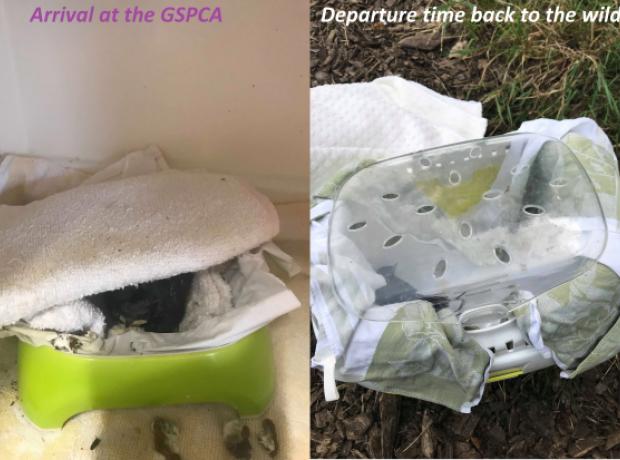Links to vets in Guernsey
Local useful links
Website donated by:

This week 2 young Swallows were returned back to the wild.
Donald and Lucky the Second arrived at the Shelter as extremely young birds having been found at a stables in St Saviours on the 11th August.
After nearly 4 weeks of care primarily by Senior Animal Care Assistant Yvonne Chauvel and Animal Care Assistant Beckie Bailey the young birds were ready to release to the wild and on Tuesday Beckie popped in on her day off to take them back to where they belonged before what will be an epic migration.
Beckie said “It was wonderful to release Donald and Lucky the Second on Tuesday.”
“It was amazing to watch them fly around the field which I got a great video of and then as I was driving away I managed to continue to watch them for some time.”
“To see them back in the wild is really amazing.”
Yvonne said “It’s never easy hand rearing baby birds as often they are so weak or injured when they arrive at the GSPCA.”
“It’s been a real joy hand feeding Donald and Lucky the Second and to get them back to the wild is what we do the job for.”
Steve Byrne GSPCA Manager said “We often use our intensive care units when we have the baby birds to start their stay at the GSPCA before being moved on to bigger pens as they grow and develop.”
“When Donald and Lucky the Second arrived it was the same week we launched the plans for our proposed new Wildlife Hospital we would love to build.”
“We are appealing for those wishing to help with this huge project to please get in touch by calling 257261 or email [email protected] .”
“There are many other ways to support and help birds like these swallows from volunteering to becoming an Angel Pen Pal Sponsor.”
“From all the GSPCA we all wish Donald and Lucky the Second good luck in the wild and with their long migration for winter and we hope to see them next year back in Guernsey having their own nestlings.”
For advice on what to do if you see a wild animal injured or sick please call 257261 or check out these helpful web pages - http://www.gspca.org.gg/animals/wildlife-advice
To learn more about our biggest project, become an Exclusive Build Partner and support our Wildlife Hospital please visit http://www.gspca.org.gg/page/gspca-exclusive-build-partner
Our next Volunteer Induction is on Monday 1st October at 630pm and for details http://www.gspca.org.gg/about/volunteers
If you would like to help at one of our upcoming events or book a table at our Ball please give Michelle a call on 257261 or email [email protected]
To become an Angel Pen Pal Sponsor to sponsor the hoglets and support our work please visit - http://www.gspca.org.gg/about/angel-sponsorship-scheme-animals-needing-guernseys-everlasting-love
To donate to the animals in our care please visit - www.paypal.me/DonateGSPCA
To see our Wish List on our website please visit - http://www.gspca.org.gg/about/our-plans-wish-list
Some Swallow facts –
To see the opening hours at the GSPCA please visit – http://www.gspca.org.gg/page/gspca-opening-visiting-times
To see our upcoming guided tours please visit - http://www.gspca.org.gg/services/guided-tours-gspca
For other fund raising ideas and ways to support please visit - http://www.gspca.org.gg/fundraising
To visit the details on the Urgent Kennel Floor Appeal please visit - www.gspca.org.gg/blog/urgent-kennel-floor-appeal-%E2%80%93-kennel-flooring-work-discovers-need-new-drains-and-completely-ripp
To find out how your business could help us at the GSPCA http://www.gspca.org.gg/about/how-your-business-can-help-gspca-corporate-sponsorship



Post new comment
More information about formatting options